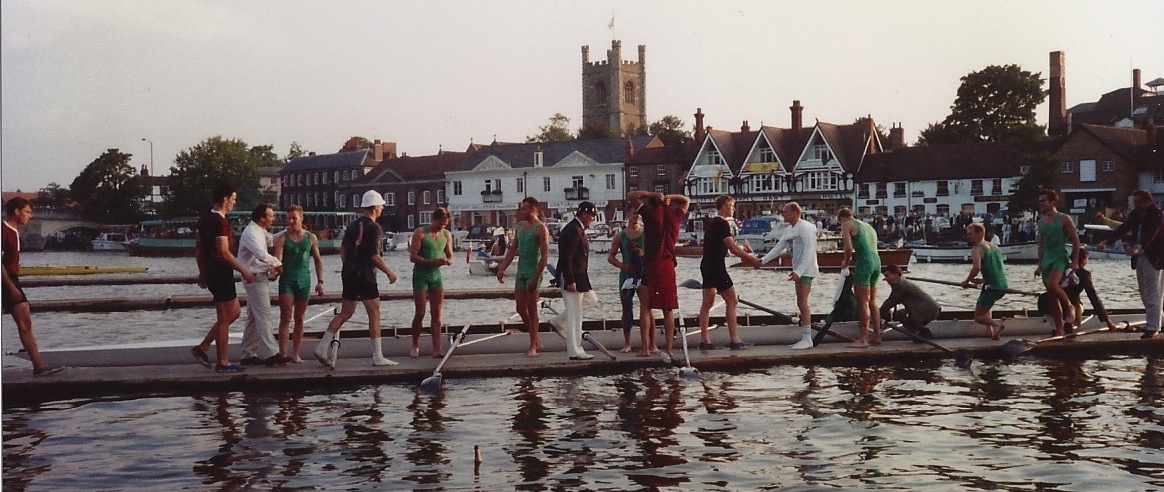The International Football Association Board, the guardian of the laws of association football, meets in the spring of each year. The 2011 meeting on 5 March (pdf of agenda) takes place at Celtic Manor – which gained global prominence as a sporting landmark in October 2010. Founded in 1886 when representatives of the football associations in England, Scotland, Wales and Ireland met to harmonise the sport’s laws across the ‘Home Nations’, the Board was joined by FIFA in 1913. Football’s world governing body now contributes four members to sit alongside the four founding members. (The Irish FA was founded in Belfast in 1880 and governed the game across the whole of Ireland until clubs in the south formed the Football Association of the Irish Free State, later the FAI, on 1 June 1921.)
It’s fitting that IFAB meets in the spring as it falls within the season of shrovetide when ancient folk football matches that are still played in various parts of England and Scotland. These games, which resisted the prohibitions of numerous monarchs down the centuaries for fear of their impact on archery practice, the defense of the realm and general good order, provide a glimpse of the ancestors of the modern sports of both football and rugby.
Ashbourne, Derbyshire hosts the oldest and probably best known Shrovetide game. Asbourne Royal Shrovetide Football is played on both Shrove Tuesday and Ash Wednesday. The earliest reference to the game is a poem written in 1683: its ‘Royal’ title dates from a visit by the Prince of Wales – later Edward VII – in 1928.
A team ‘Up’ards’ born in the north side of the Henmore River take on the ‘Down’ards’ born on the south side. The pitch stretches between two goals situated 3 miles apart – one at Sturston, and the other at Clifton. Originally, the goals were the water wheels of two mills: today, they are purpose built plinths.
Kick-off or “turning up” of the specially made and painted ball takes place at 2pm from a plinth in the town centre. A goal is scored by tapping the ball three times against a marker board attached to one of the goal plinths. The game continues until 10 pm. If a goal is scored before 6 pm, then a new ball is “turned up” and a new game starts. When a goal is scored after 6 pm, the game ends for that day.
The Shrovetide football match in the Northumberland town of Alnwick is called “In Atherstone, in Warwickshire, the Shrovetide match is played along Watling Street, the Roman road linking London with Chester and the northwest. Thought to date back 800 years, the game is played between 3pm and 5pm. The winner is the person in possession of the ball at 5pm: the game doesn’t depend on teams or goals.
The Ball Game in Sedgefield, County Durham, is started at 1pm by passing the ball three times through the ‘bull ring’ in the middle of the village. It is then kicked around the village for the next three hours. There are no teams: the first person to get the ball to any of the pubs receives a free drink. After 4pm the obective is to ‘ally’ the ball into the local stream, retrieve it and then return it t the centre of the village, passing it through the bull ring three times.
Roxburghshire hosts a number of folk football matches around Shrovetide: Hobkirk’s is on the Monday after Shrove Tuesday with Jedburgh and Ancrum & Denholm staging matches during February.
Folk football is not confined to Shrovetide. Workington in Cumberland is host to a series of three matches around Easter
The Hare Pie Scramble and Bottle Kicking at in Leicestershire shares many of the characteristics of other folk football games but makes use of a cask of beer rather than a ball. The contest between the villages of Hallaton and Medbourne takes place on Easter Monday.
In Berwickshire, the married men of Duns take on the batchelors during the Reivers Week summer festival and even further north, in Kirkwall in the Orkney Islands the Ba’ Game is played on Christmas Day and New Year’s Day, between more “Uppies” and “Doonies” defined by their places of birth. For Uppies the objective is to touch the ba’ against the wall in the south end of the town, while the Doonies aim is to propel it into the waters of Kirwall Bay. Games start at 1pm and can last for up to eight hours.



